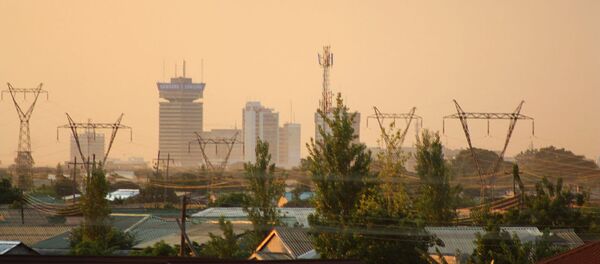"The Russian side has submitted to its Zambian partners a proposal to use a domestically developed vaccine against coronavirus ... The initiative was well received here and the issue is under consideration now", Boldyrev said.
The country has increased the testing capacity of its healthcare system in the past few months, the ambassador explained adding that recently, one of the reputable foreign travel agencies even included Zambia in the top of the world ranking of the safest travel destinations for travelers during the pandemic.
The ambassador recalled that in September, during the official ceremony on behalf of the Russian government, the Zambia's health minister Chitalu Chilufya took delivery of Russian humanitarian aid intended to combat the coronavirus pandemic.
"The reagents for conducting 5,000 individual PCR tests for COVID-19 were delivered by a special flight of Russia’s Ministry of Emergency Situations to neighbouring Zimbabwe, and then transported by the embassy's vehicles to Lusaka", Boldyrev revealed. "The minister of health expressed deep gratitude to the Russian authorities and the people of our country for such timely and valuable support, highlighting the strong nature of Russian-Zambian relations, shown in an act of solidarity in the fight against COVID-19".
In the beginning of November, Zambia’s Ambassador to Russia Shadreck Luwita told Sputnik that his country was eager to get the Sputnik V coronavirus vaccine as soon as it hits the market, adding that health ministers of the two countries were already in talks on the matter.
Russia is among the leaders of COVID-19 vaccine development with two of its products — Sputnik V, created by Moscow’s Gamaleya Institute, and EpiVacCorona, by the Siberian research center Vector — already in the Phase 3 trials.
Cooperation Agreement
An agreement on cooperation between the internal affairs ministries of Russia and Zambia has been concluded and is ready for signing, Russian Ambassador to Zambia Alexander Boldyrev told Sputnik.
"In February of this year, the delegation of the Federation Council of the Federal Assembly of the Russian Federation, headed by Valentina Matviyenko, visited the republic, which confirmed Russia's focus on building up the entire range of ties. The legal framework of the two countries was enriched last year by the intergovernmental agreement on visa-free travel for holders of diplomatic passports. An agreement on cooperation between Russia’s Ministry of Internal Affairs and Zambia’s Ministry of Internal Affairs is ready for signing", Boldyrev said.
Boldyrev pointed out that recently, there has been an intensification of bilateral contacts, including through high-level and top-level meeting. He also recalled that in 2018, Zambia and Russia entered a qualitatively new stage of interstate dialogue thanks to a separate full-format meeting of Russian President Vladimir Putin and his Zambian counterpart, Edgar Lungu, which was held in Johannesburg, South Africa, for the first time in the history of bilateral relations. In October 2019, the first Russia-Africa Summit and the Russia-Africa economic forum were held in Sochi, in which Zambian Foreign Minister Joseph Malanji participated.
Boldyrev also pointed to the recent revitalisation of interaction between the two countries' political parties, and revealed that the United Russia Party and Zambia's ruling party, the Patriotic Front, are in talks on prospective cooperation agreement.
"All this should diversify the Russian-Zambian agenda, and give the relations the necessary impetus for expanding ties between Zambia and Russia, including at the regional level. Points of contact of interests can be found in the agro-industrial complex, the military-industrial complex, energy, services, light industry, in the IT sector and tourism", Boldyrev noted.
The diplomat suggested that Russia's major manufacturers of agricultural machinery, such as the Rostselmash Group, the Tractor Plants concern, PJSC Kirovsky Zavod, and others, should analyse export opportunities, and perhaps even the possibility to assembly products in Zambia.
"Also, the authorities of Zambia are especially interested in the development of railway communication, modernisation of tracks and rolling stock. Now, trucks entering mining provinces are seriously destroying the roadbed, which would have been avoided with the normal functioning of the railway transport. Moreover, domestic companies producing mineral fertilisers, PJSC Uralkali of the Perm Territory and JSC UCC Uralchem from Moscow, have significant potential for developing the local market and continue to "look closely" at the profitability of doing business in the region", Boldyrev said.
The ambassador went on to say that given the continuing high demographic dynamics, the predominance of young people under 35 and their lack of access to modern digital financial technologies, the participation of domestic companies in the IT sector may become the basis for bilateral cooperation in the future.
"We are talking not so much about recognised IT giants like Yandex and Mail.ru Group, but rather about small companies involved in the creation of information resources, Internet services and mobile applications. Zambia highly appreciates the vast scientific and technological experience and production capabilities of Russia, and expresses interest and readiness to expand mutually beneficial partnerships in these areas", Boldyrev added.
According to the Russian ambassador, the project for construction of the Centre for Nuclear Science and Technology, launched in Zambia in 2015 under the auspices of Russia's Rosatom, "continues to play the role of the locomotive in promoting capital-intensive projects in the Zambian market".
Boldyrev underscored that since the establishment of the Zambian state in 1964, Russia and Zambia have been building their relations on the basis of friendship, equal partnership and constant consideration of each other's interests. He noted that this line is reflected in the promotion of the international agenda, where the two nations' positions coincide or are close. The diplomat specified that this applies primarily to such a global institution as the United Nations.
Commenting on the coverage of Russia by the Zambian media, Boldyrev pointed out that Zambian publications about Russia are largely benevolent, maintaining a respectful and friendly tone. The ambassador noted that the share of analytical and editorial articles is traditionally small, and also explained that visits by reporters from Zambia to foreign countries are extremely rare because of their infrequent inclusion in official delegations due to the lack of funds for such overseas trips by media operators.
"The government's modest financial support for the Zambian media market also prevents them from maintaining foreign bureaus, forcing them to use the services of leading news outlets. In the column of international news, you can often find reprinted articles of the English-language press, and not materials revised by the editors containing the author's conclusions", Boldyrev noted.
Boldyrev said that the Russian embassy is trying to actively interact with representatives of the Zambian media. He underscored that any foreign news piece has a chance to become a leading article in the Zambian print and online publications only in the case of direct or indirect participation of the Zambian side in it.
"Exceptions can be made only for credible foreign media companies, whose articles describe the social and economic achievements of the Republic in a positive way. In the absence of Russian bureaus in the host country, only by increasing interstate and cultural interaction can the level of citation of the Russian press be raised and the accents in the perception of Russian events can be shifted", the ambassador recalled.
The diplomat also noted that Zambian TV broadcast a speech for the Russian audience on the Russia Day, celebrated annually on 12 June.
Creation of Nuclear Science Centre
Zambia is currently completing preparations for the creation of the Centre for Nuclear Science and Technology (CNST) with assistance from Russia, Boldyrev said.
The diplomat stated that Zambia and Russia held the first online meeting of their bilateral coordination committee in September as part of the implementation of the provisions of the intergovernmental agreement on the CNTS construction.
"The parties assessed the progress of the CNST project, the development of the regulatory framework, personnel training, and touched upon plans for a feasibility study for the construction of a full-fledged nuclear power plant. The participants agreed that all the listed areas of activity require the earliest possible achievement of practical results. The representatives from Zambia promised to complete the formation of the necessary legislative framework by the end of this year", Boldyrev said.
The diplomat added that the coordination committee convened again in mid-December, this time in a live format.
"The details of the meeting have not yet been specified, but, as we know, after the visit of Rosatom specialists to the republic, the Cabinet of Ministers of Zambia approved the preparation of a policy on the peaceful use of the atom, which is another step forward", Boldyrev stressed.
Boldyrev also assessed CNST as one of the key Rosatom's projects in the framework of enhancing Russian-African cooperation.
"Despite the certain economic difficulties in the country, the corporation is taking all necessary measures to maintain the dynamics of the project for the construction of the center. The Zambian partners were offered approaches providing for the optimisation of the project financing structure and the implementation of the first stage of work at the expense of the customer. Specific proposals were included in the draft supplementary agreement to the general contract", Boldyrev noted.
In November, Zambian Ambassador to Russia Shadreck Luwita told Sputnik that Zambia will prioritise the CNST construction in the hope it will help ensure food security and boost medical research. Zambia has already moved ahead with the plan, identifying the construction site and conducting engineering surveys, Luwita added. However, the coronavirus pandemic and the drought made the Zambian government move the construction of an irradiation center to the top of its agenda, the ambassador said. On the other hand, the plan to build the much-touted nuclear power plant will be shelved to give the economy a breathing space.
Boldyrev pointed out that Zambia is an export-oriented country with a strong commodity-oriented economy, stressing that the Zambian economy continues to be based on the mining sector (16 percent of GDP, of which copper accounts for 12.2 percent) and, above all, metallurgy.
The ambassador noted that the revenues from the sale of copper and cobalt account for up to 70 percent of all foreign exchange earnings, de facto determining the financial position of the country and making it directly dependent on world quotations for natural resources.
"Deposits of copper ores along the watershed of the Congo and Zambezi rivers [450 km-long and 45-75 km-wide] secured the status of the world's leading miners and main exporters of 'red metal' on the Black Continent to the Republic of Zambia and the DRC [Democratic Republic of the Congo]. The North-Western province and the Copperbelt province are Zambia's centers of the metallurgical industry [accounting for70 and 30 percent of production respectively]", Boldyrev explained.
Boldyrev went on to say that in addition to copper, the bowels of Zambia are rich in precious and semi-precious minerals, including emerald, beryl, garnet, amethyst, aquamarine, and there are also large deposits of malachite and quartz, while gold and silver are found among the precious metals.
"Zambia remains extremely interested in attracting foreign expertise for integrated exploration and development of the country's mineral resources. At present, the republic is facing certain difficulties in the lack of proper skills and equipment when carrying out prospecting and appraisal works and geological and technological mapping of deposits. Most of the existing copper mines were founded during the colonial period", the ambassador said.
Boldyrev pointed out, however, that the Zambian government is currently making active efforts to attract foreign direct investment in the exploration of gold and uranium deposits.
"The extensive experience of the Russian companies in this area can be a significant incentive for our participation in the development of the most attractive fields", Boldyrev said.
According to the ambassador, Russia's upper chamber speaker Valentina Matviyenko's February visit to Zambia was a milestone in the development of bilateral ties.
"Particular importance is attached to the fields of agriculture, mechanical engineering, geological exploration, medicine, and nuclear energy. Zambia’s leadership and its business community, traditionally demonstrates a trust towards Russia as a reliable business partner and ally. Nevertheless, there is a certain problem of positioning Zambia on the part of Russian entrepreneurship as Terra Incognita in the absence of proper advisory and information support", Boldyrev added.
The diplomat stressed that the current level of trade and economic relations between Russia and Zambia, cannot be currently assessed as high or corresponding to the existing potential, despite the attractiveness of the South African region for the Russian business community, although it has increased significantly over the past year,
The ambassador recalled that Zambia ranked 115th among all foreign economic partners of Russia, with the volume of foreign trade at the level of $98 million in 2019.
Boldyrev concluded by saying that such year-on-year progress was made possible due to the defense contracts and the supply of Russian equipment to Zambia.
Visa-Free Deal
Moscow expects a response from the Zambian authorities on the text of the Intergovernmental Agreement on a visa-free regime in order to sign the document next year.
"The proposal to sign an Intergovernmental Agreement on a visa-free regime for mutual trips of Zambian citizens and citizens of the Russian Federation was made by the speaker of Russia’s upper house, Valentina Matvienko, in a conversation with President Edgar Lungu during her official visit to the Republic of Zambia and was positively received by the Zambian side. Now, the text of the corresponding agreement worked out by the Russian competent authorities is at the final stage of consideration by the other side", Boldyrev said. "We hope to receive a response by the end of this year, making it possible to sign it in 2021."
Boldyrev pointed out that the tourism sector plays an important role in the life of Zambians.
"In addition to the world-famous Victoria Falls, which is a UNESCO World Natural Heritage Site and logistically conveniently located, Zambia is known as a safari country and a great place for watching animals", he explained. "From October to April a large number of migratory birds nest here, from October to December, in the Kasanka National Park there is a major migration of mammals in the world — more than 10 million palm fruit bats settle in the park. At the beginning of a rainy season, Liuwa Plains National Park becomes the site of the second largest wildebeest migration (after the Serengeti Park in Tanzania)."
Moreover, the diplomat said, national parks such as South Luangwa and Lower Zambezi are featured year after year on the lists of the world's best wildlife excursion routes.
"According to Zambia’s Ministry of Tourism, about 1 million foreigners visit the country annually (of which 26% for recreation), while the tourism industry brings Zambia $1.8 billion or 6.7% of the country's GDP", Boldyrev noted. "In the medium term, Zambia plans to take the lead in eco-tourism."
In the beginning of November, Zambia’s Ambassador Shadreck Luwita told Sputnik that Zambia and Russia were considering ending mutual visa requirements for travelers to promote tourism after they lifted curbs for diplomatic staff in July.
A plan to allow visa-free travel between the two countries was put on hold over the lockdown alongside other programs outlined after the first Russia-Africa summit in October of last year.
Luwita said the southern African country had a lot of potential for tourism growth and was looking to partner up with Russian travel agencies to alert travelers to the possibility of going to Zambia.




